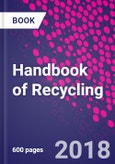Winner of the International Solid Waste Association's 2014 Publication Award, Handbook of Recycling is an authoritative review of the current state-of-the-art of recycling, reuse and reclamation processes commonly implemented today and how they interact with one another. The book addresses several material flows, including iron, steel, aluminum and other metals, pulp and paper, plastics, glass, construction materials, industrial by-products, and more. It also details various recycling technologies as well as recovery and collection techniques. To completely round out the picture of recycling, the book considers policy and economic implications, including the impact of recycling on energy use, sustainable development, and the environment.
With contemporary recycling literature scattered across disparate, unconnected articles, this book is a crucial aid to students and researchers in a range of disciplines, from materials and environmental science to public policy studies.
- Portrays recent and emerging technologies in metal recycling, by-product utilization and management of post-consumer waste
- Uses life cycle analysis to show how to reclaim valuable resources from mineral and metallurgical wastes
- Uses examples from current professional and industrial practice, with policy and economic implications
Table of Contents
I RECYCLING IN CONTEXT 1 Recycling: A Key Factor for Resource Efficiency 2 Definitions and Terminology 3 Recycling in Context 4 Recycling Rare Metals 5 Theory and Tools of Physical Separation/Recycling
II RECYCLING APPLICATION & TECHNOLOGY 6 Recycling of Steel 7 Copper Recycling 8 Lead Recycling 9 Zinc and Residue Recycling 10 Recycling of Rare Metals 11 Recycling of Lumber 12 Paper Recycling 13 Plastic Recycling 14 Glass Recycling 15 Textile Recycling 16 Cementitious Binders 17 Industrial By-products 18 Recovery of Metals from Different Secondary Resources (Waste) 19 Recycling of Carbon Fibers 20 Recycling of Construction and Demolition Wastes 21 Recycling of Packaging 22 Material-Centric (Aluminum and Copper) and Product-Centric (Cars, WEEE, TV, Lamps, Batteries, Catalysts) Recycling and DfR Rules 23 Separation of Large Municipal Solid Waste 24 Recovery of Construction and Demolition Wastes 25 Waste Electrical and Electronic Equipment Management 26 Developments in Collection of Municipal Solid Waste
III STRATEGY AND POLICY 27 From Recycling to Eco-design 28 Recycling and Labeling 29 Informal Waste Recycling in Developing Countries 30 Squaring the Circular Economy 31 The Economics of Recycling 32 Geopolitics of Resources and Recycling 33 Recycling in Waste Management Policy 34 Voluntary and Negotiated Agreements 35 Economic Instruments 36 Information Instruments 37 Regulatory Instruments: Sustainable Materials Management, Recycling, and the Law
Appendix 1: Physical Separation 101 Appendix 2: Thermodynamics 101 Appendix 3: Life-Cycle Assessment








